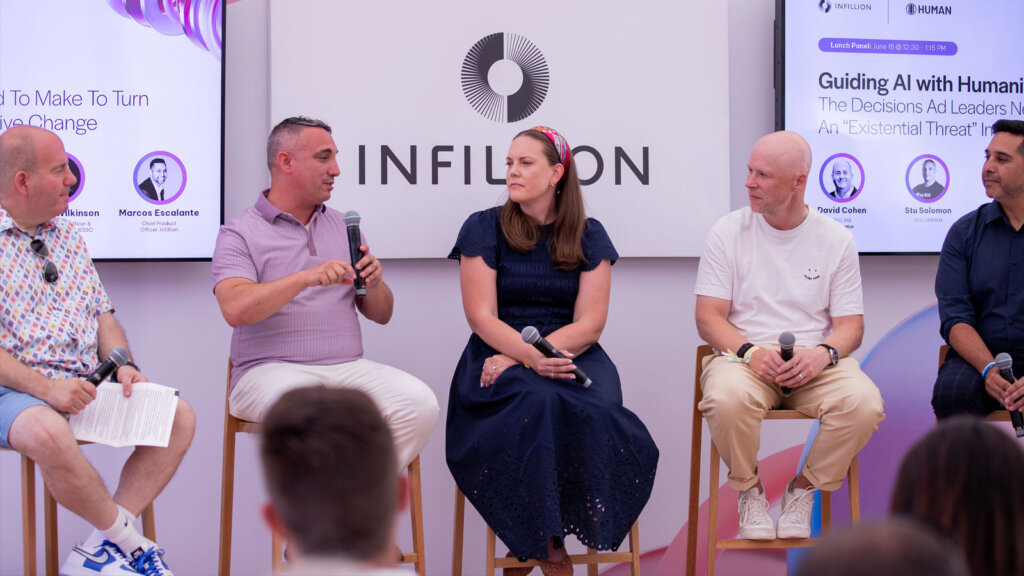Conversations about AI were, predictably, everywhere at Cannes Lions. From the rise of agentic systems within holding companies to the use of generative technology in building and customizing creative, it was unavoidable. Yet one topic, we figured, might be unexplored: How do leaders in advertising grapple with these changes? What are the decisions that will change how their companies and workforces do business? And how can these decisions be made through an ethical, people-first lens?
Infillion partnered with HUMAN to take on this discussion in a panel moderated by David Cohen, CEO of the IAB. It’s imperative, after all, because it’s already happening. “When you look at the proliferation of traffic that’s going to be on the internet – by many accounts, it looks like 85% of all traffic that visits websites in the next few years is going to be agentic in some way,” said Stu Solomon, CEO of HUMAN.
The industry’s choice about how to approach AI is one of “speed versus soul,” said Infillion chief product officer Marcos Escalante. In other words, a rush to innovate at all costs may impact the ability to make ethically rooted decisions for the long term. That’s crucial for an industry like advertising that relies on being able to connect and persuade actual people, and where most importantly, there needs to be a relationship rooted in trust. Research has shown that consumers are wary of brands that use AI in ads – particularly those that do so without adequately disclosing it – and that that wariness is growing, not shrinking.
So what’s an ethically-focused advertising leader to do?
AI can power growth – but with skilled oversight
The panel agreed: AI is opening up opportunities for diverse, small players in advertising to make an impact that they might not have otherwise. Sarah Chaten, SVP of Media Strategy and Operations at Group Black, said that generative and agentic AI together make it possible for a company with a smaller workforce to accomplish more with a lower headcount – including creating ultra-customized, premium creative for highly specific audiences and even individuals.
Plus, it’s an advantage when consumers are already using the same AI technologies in their daily lives. “We’re a small, fast-moving startup focused on the new majority who is already digitally native, already using this in their phones,” Chaten said.
“We have been putting people into buckets, into cohorts,” moderator David Cohen said. “AI will give us the ability to unlock new audiences, undoubtedly.”
There are, however, drawbacks that demand mindful and hands-on leadership. One of them is that AI isn’t perfect, and overreliance on it can backfire. “The real risk there is blind adherence to the chatbot that gave you the answer,” Chaten said. “‘Well, it’s AI, so it must be right.’ So that’s what we’re balancing within our organization right now.”
As a diversity-first company, Group Black has also been vocal about how LLMs are being trained and what bias might be present in that information. This, too, requires careful oversight. “How do you get to that human element, and what are your core data sources that are underlying that?” Chaten posed.
A solution to the silo problem?
One growing area for AI optimism among advertising leaders is the potential for streamlining workflows through the use of agentic systems.
“We’re an industry of silos… We create new departments and we just give people reasons not to work with each other, basically,” said Graham Wilkinson, chief innovation officer at KINESSO, arguing that AI can break down the bureaucracy caused by these silos. “Human beings, we have physical limitations…agents don’t care about any of that stuff and none of those boundaries matter.”
This comes up against some very stark economic realities for the ad industry. “Everybody’s looking at the agency world right now and saying, ‘Drive efficiency. Cut down your costs,’” Wilkinson added.
But being too AI-forward in business processes can negatively impact human nuance, as Group Black’s Sarah Chaten said she’s seen when hiring young talent whose initial forays into the professional world happened over screens during COVID-induced remote work. “They have been trained on screens, [these] new incoming associates,” Chaten said. “They watch videos, they watch trainings, and they can answer the question – but [without] all the nuance that happens in the room with their clients and their partners.”
The most important AI buzzword right now: Trust
Trust is fundamental to the relationship between advertisers and consumers. It’s also fundamental to the relationship between advertising leaders and the AI systems they use.
“All of this is predicated on the same notion, which is trust,” HUMAN’s Stu Solomon said. “I should trust this agent to act on my behalf…If you start to mistrust the outcome of the decision logic, then the whole thing breaks down.”
Infillion’s Marcos Escalante chimed in. “That verification piece, I think, is so much work,” he said. “What happens when you need to be 100% sure that this is the correct answer?”
One thing is 100% sure: Ethical leadership in AI requires industrywide cooperation. It’s not enough for a few companies to commit to a principled balance between the humans and the machines if the rest of the advertising business isn’t following them.
“We all saw what happened with social media. It started on college campuses, it was a way to talk amongst friends, it became a global phenomenon that didn’t have certain standards, and we’re continuing to notice the impacts both positive and negative,” Group Black’s Sarah Chaten said. “I think we’re at the precipice with AI. Having a moral system codified within some regulation, I think, will avoid that dystopian future…How fast we move with that is to be determined, and [so is] who actually gets a seat at that table.”
At Infillion, mutual trust is crucial to our client relationships – whether AI’s involved or not. If you’re interested in an advertising partner who operates with transparency and principles rather than smoke and mirrors, reach out to us.

